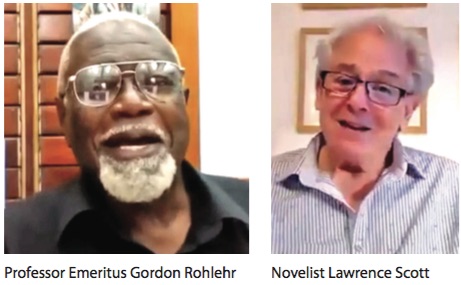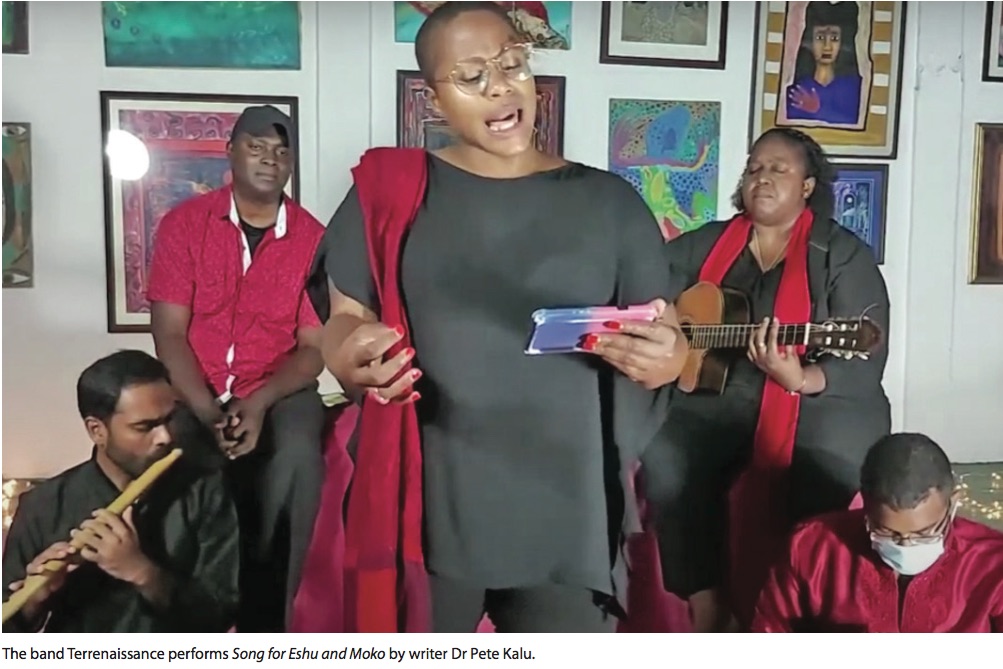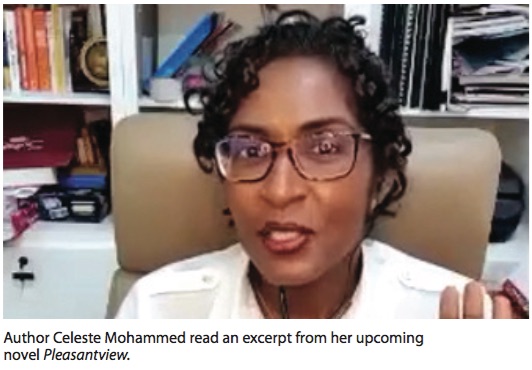For the first time in its 23-year history, Campus Literature Week had no writer-in-residence, and was pushed online for the second year in a row due to the COVID-19 pandemic. These setbacks didn’t prevent organisers from securing in-depth interviews with noted local authors including Celeste Mohammed and Lawrence Scott, who shared insights into their recently published and upcoming work.

Campus Literature Week is annually organised by students in the Masters of Fine Arts (MFA) Creative Writing programme at The UWI St Augustine’s Department of Literary, Cultural and Communication Studies. This year’s theme was “Channelling Literary Wisdom”. Established authors were put in conversation with emerging authors, shedding light on topics such as the writing process and inspiration. In addition to the customary lunchtime readings featuring both students and established authors, there were also roundtable discussions, a musical performance and a live lecture with Professor Emeritus Gordon Rohlehr, all hosted virtually on the department’s website.
Rohlehr read from his 2020 experimental memoir, Musings, Mazes, Muses, Margins, which was long listed for the 2021 OCM Bocas Prize for Caribbean Literature in March. Musings is written in multiple forms – poetry, fiction, journal excerpts and philosophical creative non-fiction. An interesting aspect of the work, as Rohlehr shared, is the exploration of his “three personalities” – Danielle, Frederick and Gordon, which are derived from his first and middle names. Rohlehr said he explored his relationship to Rastafarian ideology as well by referring to these personalities as “I & I & I” – a play on the Rastafarian term “I & I”, meaning “we”. The three personalities also play on the Holy Trinity, as Rohlehr also explores his relationship to religion.

Reading from the first chapter, “Six Parables of Disconnection”, Rohlehr shared the story of discovering the ability of “prophetic vision” as a child, which he attributed to African heritage, and quickly learning to repress such tendencies from his Christian, middle class family. “The entire book is about disconnection; about my disconnection from places and issues and sometimes people. The main place is UWI, where I spent the last 40 years – some of which were acrimonious – but I enjoyed my stay here,” said Rohlehr.
Religion, much like race, class and sexuality, was a common theme among many of the writers featured. Novelist Lawrence Scott said his latest book, Dangerous Freedom, dealt primarily with race and identity and is important in terms of racial history. Dangerous Freedom was launched on March 24 via Zoom. The book fictionalises the story of Dido Elizabeth Belle, a mixed-race woman raised in the home of England’s Lord Chief Justice in the 18th century. According to Scott, although there are historical works and even a movie that discuss Belle’s life, his research points to Dangerous Freedom being the first novel to do so.
He added that Dangerous Freedom is his first novel set outside of Trinidad or without Trinidadian memory. Scott added that he’s working to excavate or redress history and move away from romanticism with this text. “The main character is from the extended Caribbean and the novel was grown out of my Caribbean consciousness. These subjects – sexuality, race – have become important themes if you like, or concerns of all my fiction in some way or another, and the politics of these things. I wanted to de-romanticise history,” said Scott.
Although Scott’s work is generally referred to as historical fiction, he denied this, giving a deeper explanation for his purpose as a writer. Scott described his writing as having a subgenre of fictive empathy (where the fiction writer engages with history empathetically). “I wouldn’t consider myself as writing historical books. I write books that are inspired by history. I wanted to explore myself in that history and I wanted to explore the history, and writing gives me a chance to explore myself and the world around me.”
While Scott’s work focuses on de-romanticising the past, author Celeste Mohammed shared the ways in which her work is de-romanticising the present. Mohammed read an excerpt from her upcoming novel Pleasantview, which follows corrupt political candidates, domestic abuse victims and other characters occupying the “dark side of the Caribbean dream”. Although a novel, Pleasantview is written in a series of short stories.

“The inspiration for Pleasantview in the simplest sense is Trinidad and Tobago. What I tried to do in Pleasantview was hold up a mirror to modern Trinidad society and say, ‘These are our prejudices. Do we really want to continue like this?’ I’m asking the reader to reconsider what they learnt growing up,” said Mohammed.
“I’m trying to strip off that rainbow country veneer. The rainbow country is an incomplete story because every person I’ve ever met in Trinidad and Tobago feels they’ve been victims of prejudice. We are all complicit in perpetuating certain prejudices – of race and religion. Pleasantview is a provocation. I’m asking readers: Could you possibly have some compassion? Could you possibly see the other side of the coin?” remarked Mohammed.
The book was written in both English and Trinidadian Creole, meaning that the local vernacular was not only used in the dialogue, but also in the narration. Highlighting Creole was important to Mohammed as it presented a challenge not only of technique, but also of overcoming her own personal prejudices. “It was very difficult for me to write in Creole. In the time that I grew up, it was not called Creole or Trinidadian English or Trinidad Patois. There were no nice names for it. It was simply bad English, and it had been drummed into me that it was not acceptable. As I began writing though, I discovered that T&T culture can’t be represented in Standard English because it sounds so robotic. Creole is agile and that’s great. It evolves quickly and is not standardised – it’s alive and growing and we have to evolve with the language and learn how to use it,” observed Mohammed.
She also added that she believes The UWI as a “West Indian” institution plays a significant role in the inclusion of Creole in academia. Mohammed used Belize as an example of a Caribbean country that had made progress in standardising Creole and including the language in the education system. “UWI has to grapple with the question of using Creole in academia and whether or not it wants to accept scripts in Creole. That’s what academia is here for.”
Other writers featured at this year’s Campus Literature Week included Breanne McIvor, Danielle Boodoo-Fortuné, UWI instructor Rhoda Bharath, June Aming and Alake Pilgrim. Regional writers were also featured including Celia Sorhaindo from Dominica, and Ide Thomas and Sammarko Lightbourne of The Bahamas. MFA students who shared their work include Rashad Hosein, Stacy Lela, Elyse Harlow, Garvin Parsons, Nadja Nabee, Patti Ali, Vishala Christopher, Megan Cox, Sunnil Whittle, Randy Ablack, Al Alexander and Christopher Thomas. There were also two spoken word performances by Derron Sandy and Shaquilla Sylvester.
In her introduction to the event, Dr Muli Amaye, MFA Creative Writing Programme Coordinator, said the virtual Campus Literature Week was a symbol of resilience: “This past year has not been the easiest for a lot of us but we’re still here, we’re still writing and virtually, we are still together.”
Campus Literature Week 2021 can be viewed online at https://campuslitweek2021.weebly.com/.